人教新目标八年级上英语课件 Unit 5 教案
- 格式:doc
- 大小:78.50 KB
- 文档页数:16
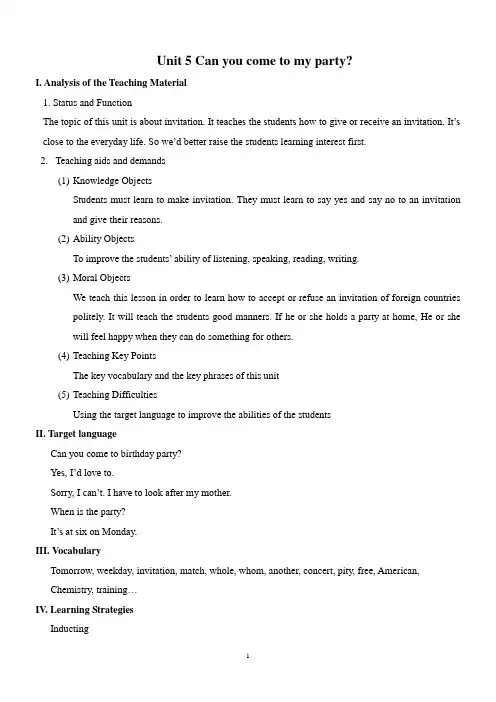
Unit 5 Can you come to my party?I. Analysis of the Teaching Material1.Status and FunctionThe topic of this unit is about invitation. It teaches the students how to give or receive an invitation. It’s close to the everyday life. So we’d better raise the students learning interest first.2.Teaching aids and demands(1)Knowledge ObjectsStudents must learn to make invitation. They must learn to say yes and say no to an invitation and give their reasons.(2)Ability ObjectsTo improve the students’ ability of listening, speaking, reading, writing.(3)Moral ObjectsWe teach this lesson in order to learn how to accept or refuse an invitation of foreign countries politely. It will teach the students good manners. If he or she holds a party at home, He or she will feel happy when they can do something for others.(4)Teaching Key PointsThe key vocabulary and the key phrases of this unit(5)Teaching DifficultiesUsing the target language to improve the abilities of the studentsII. Target languageCan you come to birthday party?Yes, I’d love to.Sorry, I can’t. I have to look after my mother.When is the party?It’s at six on Monday.III. VocabularyTomorrow, weekday, invitation, match, whole, whom, another, concert, pity, free, American,Chemistry, training…IV. Learning StrategiesInductingCooperatingV. Teaching procedures.It includes five periods. (5个课时)The First PeriodI. Teaching Aims and DemandsKey vocabulary and phrasesTarget languageTo improve the students ability of Listening and speakingII. Teaching Key Points(1) Key PhrasesStudy for a test, have a piano lesson, go to the doctor, visit my aunt(2) Target language_ Can you come to my party on Sunday?_ Sure, I’d love to._ Can you come to my party on Sunday?_ Sorry, I have too much homework this weekend.I have to help my mum.I have to go to the doctor.III. Teaching DifficultiesUsing the target language to practice the oral English in pairsIV. Teaching MethodsCommunicative methodsPairworkV. Teaching Aids多媒体VI. Teaching ProceduresStep 1Before the class, let the students listen to the music, this can guide to the new lesson. After this, ask the students to watch the movie, this can guide to the target language.Step 2 (1a)Learn the phrases and do the exercise in 1a.The answer is: b, d, a, c, eStep 3 (1b and 1c )First let the students read the dialogue in the picture. Then listen to it. (This activity provides guided oral practice using the target language). After the listening practice, ask the student to practice some invitations and refusals.Step 4 ( culture notes )When you are in foreign countries, you should know whether an invitation is a real invitation. If you are invited, but not given a specific time, this is not a rea l invitation. For example, “Why not have dinner some day?” You mustn’t ask when you can come. It’s not polite. This is a real invitation: “ Can you come to my birthday party on Saturday night? When you are asked this way, you should only say: “Yes, I’d love to”. Or “sorry, I can’t. I have to …” and give him or her your reason.Step 5 (summary and homework)Today we have learnt some key vocabulary and the target language. That is how to invite somebody and howto refuse an invitation politely. After class write the phrases in 1a in the exercise book.Step 6 (Blackboard design)The second periodI Teaching aims and demands1. Knowledge ObjectsKey vocabularyTarget languageGrammar focus2. Ability Objects_ ListeningII. Teaching key points1. key vocabularyhey, baseball game, too much homework2. Target languageA: Hey, Dave! Can you come to the movies on Saturday?B: I’m sorry, I can’tI have too much homework.I have to help my mum.I have to go to my guitar lesson.I have to visit my aunt.III Teaching difficultiesGrammar focusIV Teaching methodsListening and speaking methods.Communicative approachPairwork.VI Teaching procedureStep IGreet the class and check the homeworkStep II (2a)First, make the preparation for listening. Read the sentences twice to the class. The first time you can read “can”, the second time you can read “can”. Then let the students listen .The answers for activity 2a are : 1. can’t , 2.can 3. can’t 4. can’t 5.canStep III (2b)Ask a student to read the sentences in the box.. Tell the students these are the reason why people can’t go to the party. Listen to the recording again and number the reasons 1~3 why they can’t go to the party .The answers are : a . 2 d . 3 e . 1Step IV (2c)This is an oral practice about the target the language . You can ask the student if they can give other reasons besides the ones in 2a . If they can, make a dialogue in pair . ( First , ask two who can do it well to make a model dialogue , then let them do it in pairs .Step V . ( Grammar focus)First , let the students read the sentences in t he grammar box . Then write “ have to , has to ” on the blackboard , and tell them they are used to say no to an invitation . And then write “ be going to do something ” on the blackboard , tell the students we can say no to an invitation by talking about the future plan . After that , let them do exercises in order to master to the grammar .Step V. Blackboard designStep VI . HomeworkPlease write as many reasons as you can to refuse an invitationThe Third PeriodI Teaching aims and demands1. V ocabulary and phrases Oral practice2. Ability objectsReading, writing, communicative competenceII. Teaching key PointsReview vocabulary items and grammar focusIII. Teaching difficultyOral practice using the target languageI. Teaching methodsReading, writing methods and communicative approachV. Teaching proceduresA computerVI. Teaching proceduresStep IGreet the class and let a student to make a duty report. And then check the homeworkStep II (3a writing)Show the invitation in 3a to the students. Ask the students to fill in the blanks according to the information of the invitation.The answers are: can, party, when, on Friday, June 30 4:30Step III (oral practice)Practice the dialogue in 3a in pairs and then let some of the act the dialogue.Step IV (writing)Let the students fill in the card with details of an event. Then call your friends and invite them to the event.Step V Invite a friend (oral practice)Tell the students how to do the activity: Student A, you are Eliza. Look at page 82. Eliza , invite Lu Qing to go to the mall . Look at the calendar for this week and find a time when you can both go there.Use the dialogue in the box to start the activity , and then ask more questions to learn when both people aren’t busy . Help students t o start the work, give them a hand if needed.The answers: Lu Qing and Eliza are both free on Wednesday afternoon , Friday afternoon , Saturday and SundayStep VI. SummaryToday we have learnt how to write an invitation and done a lot of practice.Step VII HomeworkGive your best friend an invitation to an event.The student who receives it must give a reply.Step III . Blackboard designThe Fourth PeriodI. Teaching aims and demands.Target languageOral practiceII. Ability objects.Listening skillSpeaking skillCommunicative competenceIII. Teaching key points1.Key vocabulary.Sunday, Monday, Tuesday, Wednesday, Thursday, Friday, Saturday Yesterday, today, tomorrow, the day after tomorrow2.Target language.What’s today?It’s Monday the 14th.Can you play tennis with me?When?Today.Sorry, I can’t.IV. Teaching difficulties.The target languageV. Teaching methods.Listening and speaking methods.VI. Teaching aids.A calendarA computerVII. Teaching procedure.Step 1Greet the class and check the homework.Step 2 (Section B 1a)Show the students a calendar, and ask a stud ent to point out today’s date. Point to the number which shows the dates, and ask the students to copy them into the calendar in their book.Read the dates and let the students read after you.Step III (1b)1.Show the words on the screen:Yesterday, today, tomorrow, the day after tomorrow, weekday2.Let the students write the words below the correct days on the calendar in 1a.Step IV (1c)First ask two students to read the dialogue in the box. Then let them practice it in pairs by using the calendar in 1a.Step V. (listening 2a)First read the phrases in the box. Ask the s tudents “Can Vince play tennis with Andy?” Circle Yes or No.The answers are: NoStep VI. ( listening 2b )Listen again, match Vince’s activities with the days. By listening, the students can understand the language better.Step VII. (summary)Today, we have learnt how to ask the date and how to invite somebody and how to refuse and give areason.Step VIII. (homework)Make a calendar of this month after class.Step IX Blackboard designThe Fifth periodI. Teaching aims and demands.1. Knowledge objectsE-mail messageWriting practiceReading practice2Ability objectsReading and writing skillCommunicative competenceII. Teaching key pointsReading passage主语+verb+-ing I have to…III. Teaching difficultiesReading and wring practice.IV. Teaching methodsReading and writing methods and communicative approach. V. Teaching aidsA calendarVI. Teaching proceduresStep 1Greet the class, do the duty report.Step 2 (3a )First, read the e-mail message to the students. Ask the students if they have any questions. If they do, answer them. Then let the students fill in the calendar on the book. After this, explain the key language points to them.Language points:1. Thank you for… (为……表示感谢)Thank you for helping me.Thank you for your invitation.2On ( 在某天,在某天的上午、下午或晚上)I’m going to the dentist on Sunday.On Friday afternoon, I often play soccer.The answers to the calendar are:Step 3 (3b)First, tell the students when we talk about our future plans, we often use: I’m+verb+ing When we talk about what we must do, we use have to.Ask the students to fill in the blanks in 3b.The answers are: shopping, go to see, a test, I’m going, my family.Step 4 (3c)Let the students write an e-mail message to a friend. Say why you can’t visit next.Before the exercise, ask the students to give some possible answers and write them on the blackboard. So the students will feel easy to finish the writing exercise. After they finish it, Let them to correct it in groups first. Each group chooses theirs best one to read in front of the whole class.Step 5 ( planning a party )First read the conversation in the box together. Then ask the students to turn to page 88.Write down everything you have to do next week. Write in all the things you have to do .Ask the students to look at the list. Ask them “What day are you free?” This is when you can have your party.Step 6 (Self check 1 )Let the students to fill in the blanks with the words given. Change the forms of the words if possible.Then make their own sentences.The answers are: visit, playing, have to, study, comeStep 7 (Self check 2)Imagine you are Marie. Read the information and look at your schedule. Write replies to the invitation.VII. Summary and homeworkToday we have learnt how to write a e-mail to a friend. You can write another one to your frien after class.Step 8 Blackboard design11。
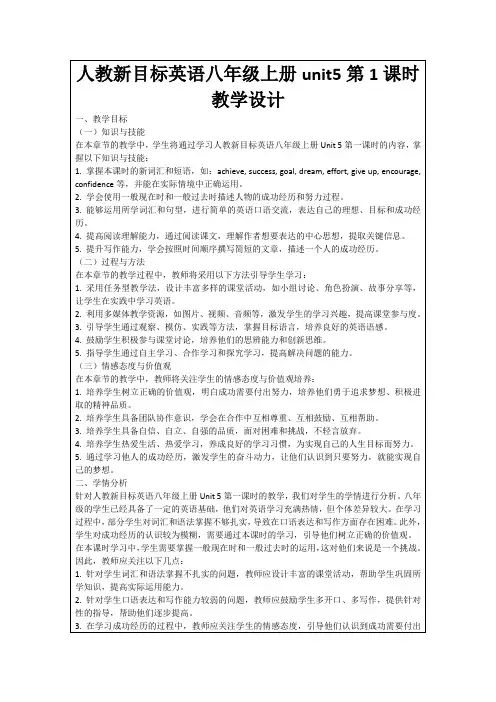
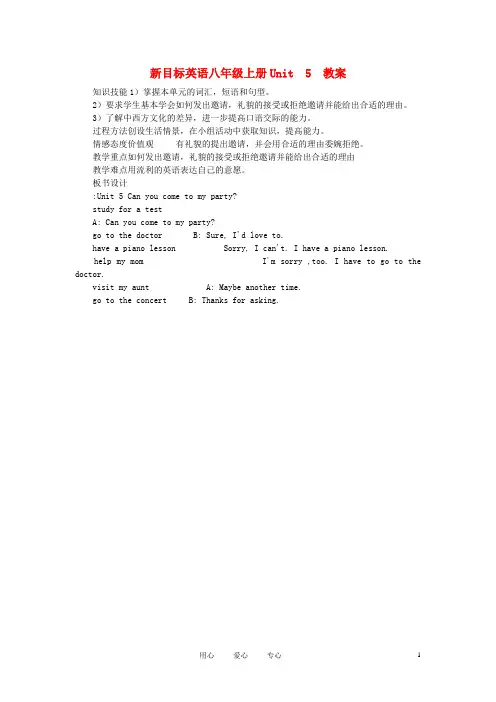
新目标英语八年级上册Unit 5 教案
知识技能1)掌握本单元的词汇,短语和句型。
2)要求学生基本学会如何发出邀请,礼貌的接受或拒绝邀请并能给出合适的理由。
3)了解中西方文化的差异,进一步提高口语交际的能力。
过程方法创设生活情景,在小组活动中获取知识,提高能力。
情感态度价值观有礼貌的提出邀请,并会用合适的理由委婉拒绝。
教学重点如何发出邀请,礼貌的接受或拒绝邀请并能给出合适的理由
教学难点用流利的英语表达自己的意愿。
板书设计
:Unit 5 Can you come to my party?
study for a test
A: Can you come to my party?
go to the doctor B: Sure, I'd love to.
have a piano lesson Sorry, I can't. I have a piano lesson.
help my mom I'm sorry ,too. I have to go to the doctor.
visit my aunt A: Maybe another time.
go to the concert B: Thanks for asking.
用心爱心专心 1。
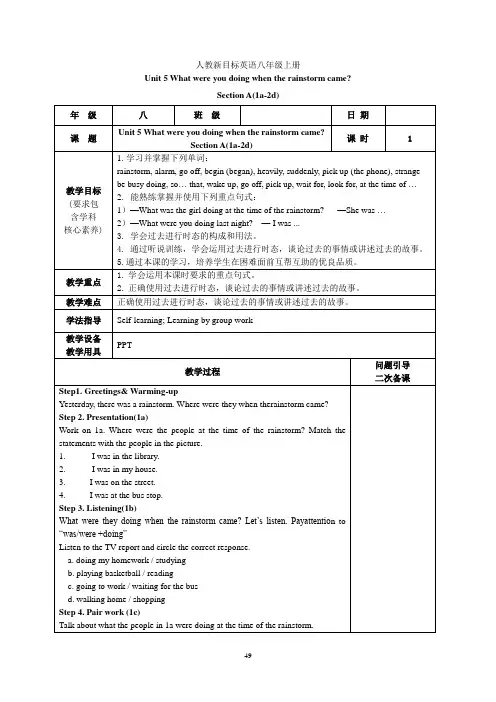
人教新目标英语八年级上册Unit 5 What were you doing when the rainstorm came?Section A(1a-2d)Section A(3a-3c)Unit 5 What were you doing when the rainstorm came?Section A(Grammar Focus-4c)Unit 5 What were you doing when the rainstorm came?Section B (1a-2e)Unit 5 What were you doing when the rainstorm came?Section B (3a-Self Check)Step 6 Self CheckSelf Check 1 Fill in the blanks with when &while. Check your sentences with your partner.Self Check 2 . Fill in the blanks with the correct forms of the words in brackets.Check the answers with the class.Step 9 Homework某英语论坛发起了一个主题为“自己曾做过的一件好事”的讨论。
请你将自己曾做过的一件好事写出来,发表在该论坛里,与大家一起分享。
不少于80词,可适当发挥。
该写作任务要求用英语写一件过去发生的事情,即要求写一篇记叙文。
写作时要注意记叙文的六要素:时间、地点、人物、事件起因、经过和结果。
可以采用正叙、倒叙或插叙的方式来写。
因为事情发生在过去,所以文章宜用一般过去时或过去进行时。
文章的整体结构可如下:引出文章话题→Here is something ...交代事情的具体经过→It was a sunny afternoon. I was ...收尾,浅谈感悟→On that day, we went back home late, but ...59。
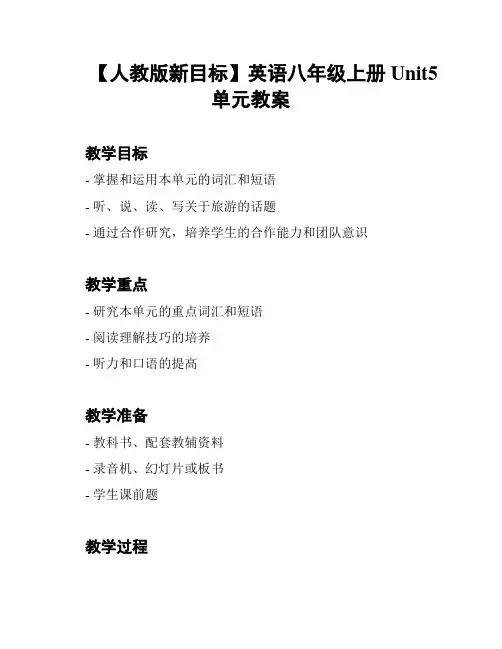
【人教版新目标】英语八年级上册Unit5单元教案教学目标- 掌握和运用本单元的词汇和短语- 听、说、读、写关于旅游的话题- 通过合作研究,培养学生的合作能力和团队意识教学重点- 研究本单元的重点词汇和短语- 阅读理解技巧的培养- 听力和口语的提高教学准备- 教科书、配套教辅资料- 录音机、幻灯片或板书- 学生课前题教学过程Step 1: 预导入- 利用图片和实物引入本单元的话题,激发学生的研究兴趣,并探讨相关问题。
- 利用问答的形式复和巩固与旅游相关的词汇和短语。
Step 2: 听力训练- 借助录音机或多媒体工具播放有关旅游的对话或短文,帮助学生提高听力技巧,并通过听后问题的设置检查学生的听力理解能力。
Step 3: 语言输入- 导入新课文,通过幻灯片或板书呈现课文,并解释生词和短语的意思,帮助学生掌握课文的内容。
Step 4: 听读训练- 学生跟读课文,注意语音语调和语速训练,提高学生的口语表达能力。
Step 5: 合作研究- 将学生分成小组,让他们合作完成教材上的活动和练,通过合作研究培养学生的合作能力和团队意识。
Step 6: 课堂巩固- 设置相关的问答题和小组讨论,加深学生对课文内容的理解和运用能力。
Step 7: 课后作业- 布置课后练,包括听力、阅读和写作练,巩固学生对本单元内容的掌握。
教学评价- 通过观察学生在课堂上的表现、听力测试、口语训练和书面作业的评改等方式,全面评价学生的研究情况和能力提升。
参考资料- 人教版《新目标英语》八年级上册教材- 相关配套教辅资料。
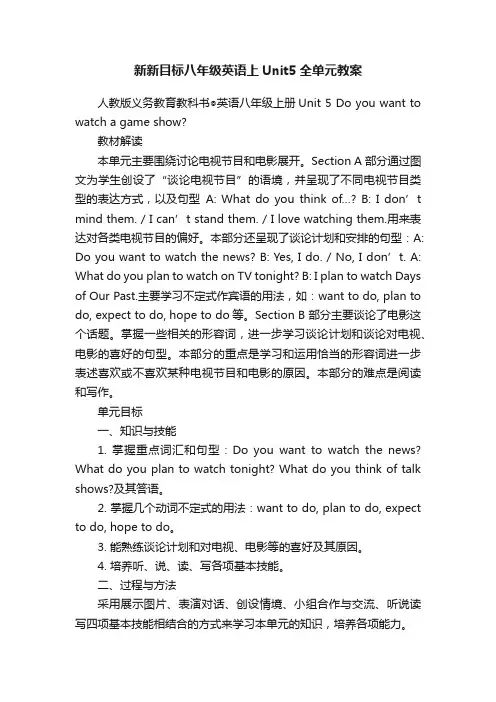
新新目标八年级英语上Unit5全单元教案人教版义务教育教科书◎英语八年级上册Unit 5 Do you want to watch a game show?教材解读本单元主要围绕讨论电视节目和电影展开。
Section A部分通过图文为学生创设了“谈论电视节目”的语境,并呈现了不同电视节目类型的表达方式,以及句型A: What do you think of…? B: I don’t mind them. / I can’t stand them. / I love watching them.用来表达对各类电视节目的偏好。
本部分还呈现了谈论计划和安排的句型:A: Do you want to watch the news? B: Yes, I do. / No, I don’t. A: What do you plan to watch on TV tonight? B: I plan to watch Days of Our Past.主要学习不定式作宾语的用法,如:want to do, plan to do, expect to do, hope to do等。
Section B 部分主要谈论了电影这个话题。
掌握一些相关的形容词,进一步学习谈论计划和谈论对电视、电影的喜好的句型。
本部分的重点是学习和运用恰当的形容词进一步表述喜欢或不喜欢某种电视节目和电影的原因。
本部分的难点是阅读和写作。
单元目标一、知识与技能1. 掌握重点词汇和句型:Do you want to watch the news? What do you plan to watch tonight? What do you think of talk shows?及其答语。
2. 掌握几个动词不定式的用法:want to do, plan to do, expect to do, hope to do。
3. 能熟练谈论计划和对电视、电影等的喜好及其原因。

人教新目标英语八年级上册Unit 5 What were you doing when the rainstorm came?Section A(1a-2d)Section A(3a-3c)Unit 5 What were you doing when the rainstorm came?Section A(Grammar Focus-4c)Unit 5 What were you doing when the rainstorm came?Section B (1a-2e)Unit 5 What were you doing when the rainstorm came?Section B (3a-Self Check)Step 6 Self CheckSelf Check 1 Fill in the blanks with when &while. Check your sentences with your partner.Self Check 2 . Fill in the blanks with the correct forms of the words in brackets.Check the answers with the class.Step 9 Homework某英语论坛发起了一个主题为“自己曾做过的一件好事”的讨论。
请你将自己曾做过的一件好事写出来,发表在该论坛里,与大家一起分享。
不少于80词,可适当发挥。
该写作任务要求用英语写一件过去发生的事情,即要求写一篇记叙文。
写作时要注意记叙文的六要素:时间、地点、人物、事件起因、经过和结果。
可以采用正叙、倒叙或插叙的方式来写。
因为事情发生在过去,所以文章宜用一般过去时或过去进行时。
文章的整体结构可如下:引出文章话题→Here is something ...交代事情的具体经过→It was a sunny afternoon. I was ...收尾,浅谈感悟→On that day, we went back home late, but ...59。
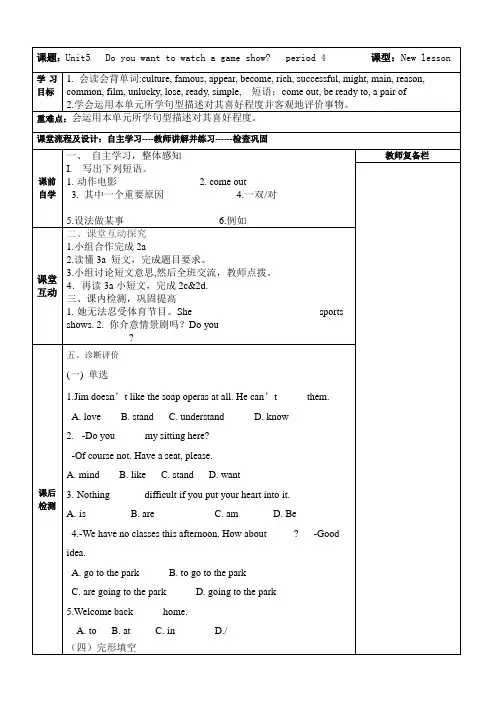
提高初二英语学习成绩的方法首先要教会科学的学习方法,就是“三习”学习法。
即:课前预先,课上学习,课后复习。
预先发现重点.难点和疑点。
学习时认真听讲.认真思考.复习时要归纳分析知识点使之形成知识版块,从而形成为自己头脑中的知识的一部分。
学好语音和单词,用音形结合记忆法,拼读规则记忆法,分类记忆法,归纳记忆法,搭配记忆法,联想记忆法,卡片记忆法等。
对话与课文要读准意群和句子。
翻译要准确通顺,然后要背诵。
听力要坚持每天抽时间读,听,说练习,并且有针对性地做些练习巩固。
关于语法,初二英语的语法点在初一的基础上有所深入,随着句型和词汇的扩展,语法似乎显得更加复杂。
分散开来好像更加繁杂琐碎,半个学期下来好像突然出现很多个小点,记忆起来很麻烦。
其实不然。
初二的每一个知识点都是初一的稍加拓展,而且知识本身也是相互关联的。
书山有路勤为径,学海无涯苦作舟!!☆比如人称代词,这时的重点已经不是主格和宾格的区分,而是形容词形物主代词、名词性无主代词、反身代词在情景对话以及写作中的应用。
还会涉及到形容词和副词的比较级、高级以及辨析名词的数、各种介词、基数词、序数词☆存在句、祈使句☆比如一般现在时,这时的重点已经不是表达习惯性动作,而是平率副词的使用规则。
还有现在进行、过去进行等等时态的综合训练☆这时也开始深入了解引语的使用、宾语从句、条件状语从句。
其实它们都是我们以前就见过的,甚至很早就见过了,现在我们只是通过更加深入系统的学习使自己在面对这些题时更加从容地得分,提高学习效率。
其实语法是得分的方法,学习语法就是学习得分的方法:比如你看到了某个标志词,你就知道用什么时态;你认识了某个句型,你就知道该填哪个关键词。
其实很快你就会知道语法比你想象得要简单。
学习英语要脚踏实地,没有捷径,但死记硬背也不是好方法。
要大声朗读,反复训练发音器官和耳朵,这样既可以提高听力,又可以改进口语发音,还记了单词。
利用一些好的方法能够让你更好地学习英语。
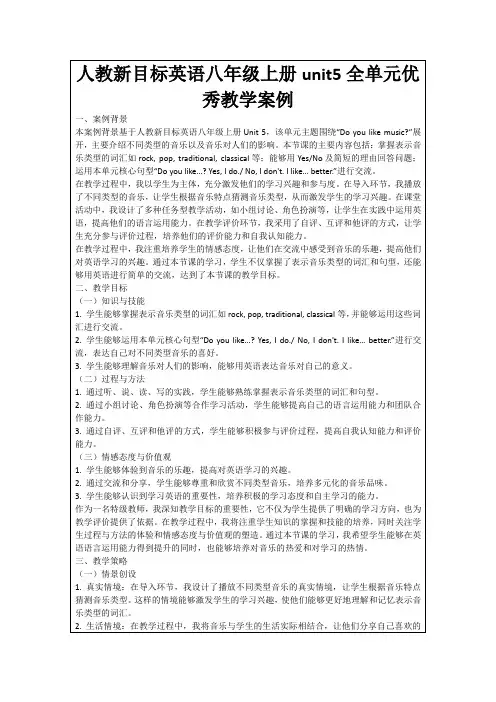
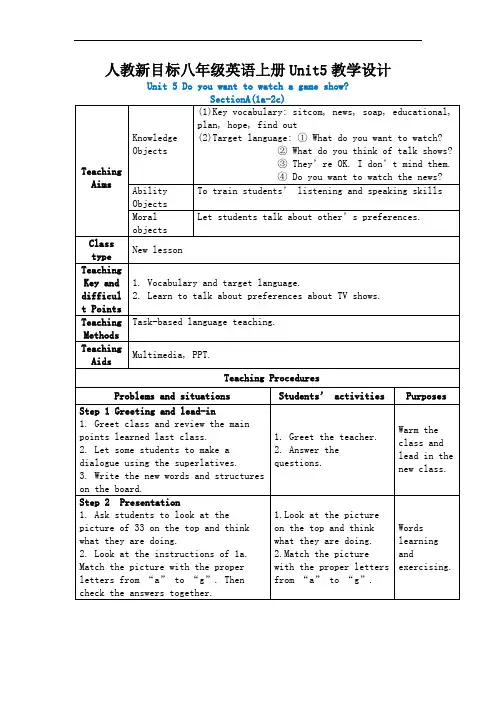

Unit 5Do you want to watch a game show?Section A (1a-1c)1.重点单词:sitcom,news,soap2.重点短语:game show,talk show,soap opera,sports show3.重点句式:What do you want to watch?—What do you think of talk shows?—They're OK.I don't mind them.I can't stand them.1.询问他人对事物的观点2.学会正确表达自己的看法1.询问他人对事物的观点2.学会正确表达自己的看法一、预习课本P33新单词并背诵,完成下面的汉译英。
1.情景喜剧____________________2.新闻节目____________________3.肥皂剧____________________二、认真预习1a-1c,找出下列短语和句型。
1.游戏节目____________________2.访谈节目____________________3.连续剧____________________4.体育节目____________________5.你想去看什么?____________________6.你认为访谈节目怎么样?它们很好,我不介意它们。
________________________________________________________________________ 7.我无法忍受它们。
________________________________________________________________________Step 1情景导入Teacher:There are many shows,such as talk shows,game shows,sports shows,soap operas and so on.What kind of shows do you want to watch?What do you think of them?Let's talk about the shows today.环节说明:由学生熟悉的电视节目入手,激起他们的学习欲望,有助于对学生学习兴趣的培养。
【人教版新目标】英语八年级上册Unit5单元教学案例第一部分:教学目标1. 研究家庭成员的称呼和关系。
2. 研究家务活动的动词和短语。
3. 学会描述家人的外貌特征和性格特点。
4. 能用现在进行时来描述家务活动。
5. 能够展开讨论并谈论家人、家庭与家务活动的话题。
第二部分:教学重难点1. 学生理解并掌握家庭成员的称呼和关系,结合自己的实际家庭情况加以运用;2. 学生能在能力范围内描述家庭成员的外貌特征、性格特点,及这些特征的体现;3. 学生掌握家务活动的动词和短语,能够用现在进行时来描述家务活动。
第三部分:教学过程Part 1 Warm-up and Lead-in Warm-up and Lead-in1. Show some pictures of family members and let students name them.2. Lead in the topic by asking students to talk about their family and family members.3. Ask students to introduce their family members and talk about their family.Part 2 Presentation and Practice Presentation and Practice1. Teach family member words and relationships by showing flashcards.2. Teach verbs and phrases related to housework by showing pictures and realia.3. Teach adjectives to describe people's appearance and character by showing pictures of celebrities and family members.4. Students practice using present continuous tense to describe housework with the teacher's guidance.5. Students create dialogues using the target language prompts provided by the teacher.Part 3 Group Work Group Work1. Divide the class into groups and ask each group to roleplay a family's daily life.2. Students will have to use the target language in their dialogues and describe the actions and appearance of family members.3. Encourage students to use their creativity and make the roleplay interesting.Part 4 Summary and Homework Summary and Homework1. Review the new vocabulary and structures learned in class.2. Ask students to write a paragraph describing their family and using the target language.3. Assign exercises from the textbook or supplementary materials.第四部分:板书设计- Family members and relationships:father, mother, brother, sister, grandfather, grandmother, uncle, aunt, cousin- Housework verbs and phrases: do the laundry, water the plants, clean the room, cook the meals, wash the dishes, sweep the floor, take out the trash- Adjectives to describe people's appearance and character: tall, short, outgoing, timid, kind, strict, hardworking第五部分:教学反思本节课采用了多媒体展示的方式,将生动的图片、实物和动画有机地结合,并通过图片、视频等直观的模式,生动活泼地介绍了本课的教学内容,使学生保持高度的兴趣和热情。
Unite 5 Do you want to a game show?短语:find out be ready to dress up take sb. place do a good job think of game show learn from talk show soap opera go on watch a movie one of….. watch a movie try one’s besta pair of as famous as look like around the world have a discussion about one day such as a symbol ofsomething enjoyable interesting information句型:----What do you think of talk shows?----I don’t mind them.I hope to be a TV reporter one day.How about you?常用法:let sb. do sth. plan to do sth.hope to do sth. happen to do sth.expect to do sth. How about doing……be ready to do sth. try one’s best to do sth.语法:Do you want to watch the news? Yes, I do . / No, I don’t.What can you plan to watch tonight? I plan to watch Days of Our Past.What do you expect to learn from sitcoms? You can learn some great jokes. Why do you like watching the news? Because I hope to find out what’s going on around the world.What do you think of talk shows? I don’t mind them./ I can’t stand them!/ I love watching them!对话:Grace: What did you do in class today,Sarah?Sarah: We had a discussion about TV shows. My classmates like game shows and sports shows.Grace: Oh, I can’t stand them. I live soap opera. I like to follow the story and see what happens next.Sarah: Well, I don’t mind soap opera. But my favorite TV shows are the news and talk shows.Grace: They may not be very exciting, but you can expect to learn a lot from them. I hope to be a TV reporter one day.补全对话:A:What do you plan to watch on TV tonight?B: I hope to _______, but I also want to ________. How about you? Do you _______ a talk show or____?A: Oh, I want to ________.阅读短文完成时间轴并回答问题。
【人教版】新目标八年级英语上册:Unit 5 单元教学设计一. 教材分析人教版新目标八年级英语上册Unit 5主要讲述了关于动物的知识。
通过本单元的学习,学生能够掌握有关动物的词汇,如lion, tiger, bear, panda等,以及表达动物特征的形容词,如big, strong, fast, slow等。
同时,学生还能够学会用There be句型描述某个地方有什么动物。
本单元的教学内容旨在培养学生的语言运用能力和观察能力。
二. 学情分析八年级的学生已经掌握了基本的英语语法和一定数量的词汇,对于动物这个话题,大部分学生都有一定的了解。
但是,学生在运用英语描述动物特征方面还存在一定的困难,因此,在教学过程中,需要教师引导学生逐步掌握描述动物的词汇和句型。
三. 教学目标1.知识目标:学生能够掌握有关动物的词汇和表达动物特征的形容词;学会用There be句型描述某个地方有什么动物。
2.能力目标:学生能够用英语简单描述动物的特征;通过观察和描述,培养学生的观察能力和语言运用能力。
3.情感目标:培养学生热爱大自然,保护动物的意识。
四. 教学重难点1.重点:掌握有关动物的词汇和表达动物特征的形容词;学会用Therebe句型描述某个地方有什么动物。
2.难点:用英语准确描述动物的特征;在实际情景中运用There be句型。
五. 教学方法1.任务型教学法:通过设置各种任务,让学生在完成任务的过程中运用英语,提高语言实际运用能力。
2.情境教学法:创设各种情境,让学生在真实的环境中学习英语,提高学习的兴趣和效果。
3.合作学习法:引导学生进行小组合作,培养学生的团队精神和交流能力。
六. 教学准备1.准备有关动物的图片、视频等教学素材。
2.设计各种任务和活动,以便在课堂上进行操练和巩固。
3.准备教材和课件,以便进行教学。
七. 教学过程1.导入(5分钟)利用图片或视频展示各种动物,引导学生谈论自己喜欢的动物,激发学生的学习兴趣。
Unit 5 Do you want to watch a game show?New words and phrases教学设计Learning Goals:一、语言知识和语言功能:1. 能争取使用下列词汇(Curriculum words)news, educational ,plan , hope, discussion , stand, happen, may, expect, joke, meaningless, action, cartoon, culture, famous, appear, become, rich, successful, might, main, reason, common, film, unlucky, lose, ready, simple, army.2. 能争取使用下列常用短语(Useful expressions)soap opera, learn about , find out, have a discussion about , action movie, be ready to, dress up, take sb’s plac e, do a good job.3. 能认读下列词汇(non-curriculum words)sitcom, comedy, girlfriend, character.4. 理解、翻译并复述运用本节课的新词汇所编写的故事,利用故事记忆单词。
二、学习策略:1. 依据图片理解和记忆词汇。
(Understand and remember the words and phrases with the help of the pictures.)2. 在语境中理解和记忆词汇。
(Understand and remember the words and phrases in the context.)3. 依据读音规则、构词规律理解和记忆词汇。
Unit 5 Do you want to watch a game show?第一课时 Period I Section A 1 (1a-2d)第二课时 Period II Section A 2 (Grammar focus-3c)第三课时Period III Section B 1 (1a-2e)第四课时Period IV Section B 2 (3a-Self check) 教材内容:了解卡通片在美国文化中的作用,以及美国著名卡通片和米老鼠等卡通形象。
情感态度与价值观:1.学会谈论流行文化,了解各类电视和电视节目的名称和自己的喜好。
注意引导学生们形成正确的文化观念,大力培养学生们的跨文化意识,形成自己独立的个性。
2.了解他人对不同的电影或电视剧的看法,明白不同的人有不同的喜好,从而明确人们喜好的差异性;了解世界其他国家的文化,形成跨文化的意识。
3.了解个体的差异性,了解自己的爱好,尊重别人的爱好。
4.了解一些影视片的内容,通过观看不同形式的影视片来了解社会,丰富自己的文化知识。
Section A 1 (1a-2d)一、教学目标:1. 语言知识目标:1) 能掌握以下单词:sitcom, news, soap, educational, plan, hope, find out, discussion, stand, happen, may, expect能掌握以下句型:①What do you want to watch?②What do you think of talk shows?③I can’t stand them.④I don’t mind them.⑤I like/love them. / I don’t like them.2) 能了解以下语法:动词不定式结构做动词的宾语;后面接动词不定式做宾语的动词。
3)学会陈述自己的看法;学会谈论自己的喜好。
2. 情感态度价值观目标:学会谈论流行文化,了解各类电视和电视节目的名称和自己的喜欢。
注意引导学生们形成正确的文化观念,大力培养学生们的跨文化意义,形成自己独立的个性。
二、教学重难点1. 教学重点:1) 学习掌握各类电视和电视节目的名称。
2) 掌握动词不定式结构做动词的宾语;了解后面接动词不定式做宾语的动词。
2. 教学难点:掌握动词不定式结构做动词的宾语;了解后面接动词不定式做宾语的动词。
三、教学过程Ⅰ. Lead-in学生们根据图片提示学习各类电视节目并且练习运用What do you think of…?Ⅱ. New wordsLearn the names of the TV shows.Ⅲ. Game1. 引导学生们看1a中的图片,根据提示依次说出每一部TV Show的名称。
2. 让学生们看图片及1a中的词汇,将图片与正确的词汇相连。
3. Check the answers with the Ss.Ⅳ. Listening1. T: Tell Ss to read the shows in the box. Make sure they know the meaning of theshows.2. Play the recording for the Ss to listen and number the shows1-4.3. Play the recording again. Check the answers with the Ss.Ⅴ. Pair work1. Let Ss look at the pictures in the box. Then explain the meaning of each expression to the Ss.2. Let Ss read the conversation after the teacher. Then let Ss make their ownconversation using the shows and expressions in the box.3. Let some pairs ask and answer about the shows.Ⅵ. ListeningWork on 2a:1. Read the shows in the box of 2a. Tell Ss to remember the information.2. Play the recording for the Ss to listen and number the TV shows [1-5].3. Play the recording again to check the answers.Work on 2b:1. Let Ss read the sentences below. Explain some main sentences for the Ss. Make sure they know what to do.2. Play the recording for the Ss to write the correct words in the blanks.3. Play the recording again to check the answers.Ⅶ. Pair work1. Tell Ss ask and answer questions about the TV shows in 2a. They can use the information that is true for them.2. Let Ss read conversation after the teacher.3. Explain some main points for the Ss.4. Ss act the conversation in pairs. Ask some pairs to act out their conversations.Ⅷ. Role-play1. Read the conversations and match the name with the right shows.①Grace a. game shows and sports shows②Sarah b. soap operas③Grace’s classmates c. news and talk shows2. Explain some new words and main points in the conversation.3. Read the conversation after the teacher.4. Practice the conversation with their partner. Then let some pairs to act out the conversation.IX. Homework:用下列词组来造句:(1) plan to … (2) hope to…(3) find out… (4) can’t stand…(5) sth. happen (6) expect to …板书设计:Section A 2 (Grammar Focus-3c)一、教学目标:1. 语言知识目标:1) 学习掌握下列词汇:joke, comedy2)进行一步复习巩固运用Section A 部分所学的生词和词组。
3)进一步学习运用所学的知识来陈述自己的看法;学会谈论自己的喜好。
4) 掌握动词不定式结构做动词的宾语这一语法知识;掌握后面接动词不定式做宾语的动词。
2. 情感态度价值观目标:学会谈论流行文化,了解各类电视和电视节目的名称和自己的喜欢。
注意引导学生们形成正确的文化观念,大力培养学生们的跨文化意义,形成自己独立的个性。
二、教学重难点1. 教学重点:1) 进一步学习运用所学的知识来陈述自己的看法;学会谈论自己的喜好。
2) 掌握动词不定式结构做动词的宾语这一语法知识;掌握后面接动词不定式做宾语的动词。
2. 教学难点:掌握动词不定式结构做动词的宾语这一语法知识;掌握后面接动词不定式做宾语的动词。
三、教学过程Ⅰ. Revision1. Have a dictation of the new words learned in the last class.2. Ask and answer questions about the different shows.What do you think of news?I can’t stand it. / I like it. / I don’t mind it. I…3. Role-play the conversation in 2d.Ⅱ. Grammar focus1. 学生阅读Grammar Focus中的句子,然后做填空练习。
①你想看新闻吗?Do you want to ____ ______ _____?②你觉得谈话节目怎么样?What do you ______ ___ _____ shows?③我不介意看。
/我不能忍受。
/ 我喜欢看。
I don’t ______ them. I ____ ______ them. I ____ ________ them.④你计划今晚上看什么节目?_______ do you______ _____watch tonight?⑤我计划看《我们过去的时代》。
I ______ ____ watch Days of Our Past.⑥你期望从情景喜剧中学到什么?What can you ______ ___ ____ from sitcoms?⑦你能学到一些很好的笑话。
You can _______ some great _____.⑧你为什么喜欢看新闻呢?Why do you like _________ ___ ______?⑨因为我希望查明在世界各地发了什么事情?Because I ______ ____ _____ ___ what’s going ________ the world.2. 学生们根据记忆,看大屏幕来完成填空练习。
3. 学生们完成填空试题后,可以打开课本检查答案,对错误的句子,单独进行强化记忆。
Ⅲ. Grammar动词不定式作宾语一、动词不定式的形式:to + 动词原形例:Jack wants to buy some flowers for Mr. Wu.二、动词不定式作宾语的用法:1.(1)有些动词后可直接跟动词不定式作宾语。
如:hope、plan、agree、choose、decide、fail、want等。